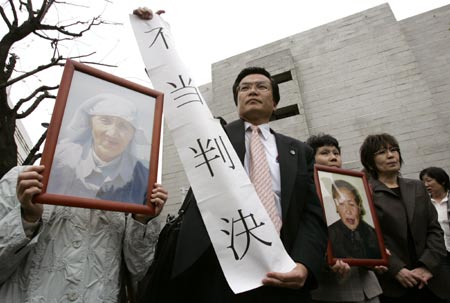Japan courts reject WW2 suits
(Reuters)Updated: 2007-04-27 10:04
Nishimatsu had argued that the statute of limitations had expired on violations of obligations to ensure safe working conditions for the workers.
"We have not yet seen the judgment, so we cannot comment in detail," a Nishimatsu official said. "But it is a victory for our company, so from that point of view we think it is an appropriate verdict."
HUNDREDS OF VICTIMS
The plaintiffs are among 360 Chinese forcibly brought from China to work in Japan in July 1944. Most of them worked at a Nishimatsu hydroelectric power plant construction site in western Japan until the end of the war in 1945.
Acknowledging that the Chinese labourers had gone through "extremely grave mental and physical sufferings," presiding judge Ryoji Nakagawa suggested that Nishimatsu work to provide relief to the plaintiffs.
Lawyers for the labourers said they planned to meet Nishimatsu executives later in the day.
Dozens of wartime compensation suits have been filed against the Japanese government and companies associated with its aggression in the first half of the 20th century, but almost all have been rejected by Japanese courts.
The issue of forced labour and sex slaves, known as "comfort women" in Japan, has attracted renewed interest after Abe sparked international outrage in March by denying that the military or the government had forced the women, most of them Asian, into sexual slavery.
Abe has since repeatedly apologised for the suffering of the victims -- most recently in a meeting with US congressional leaders during an official visit to Washington.
 | 1 | 2 |
|
||
|
||
|
|

